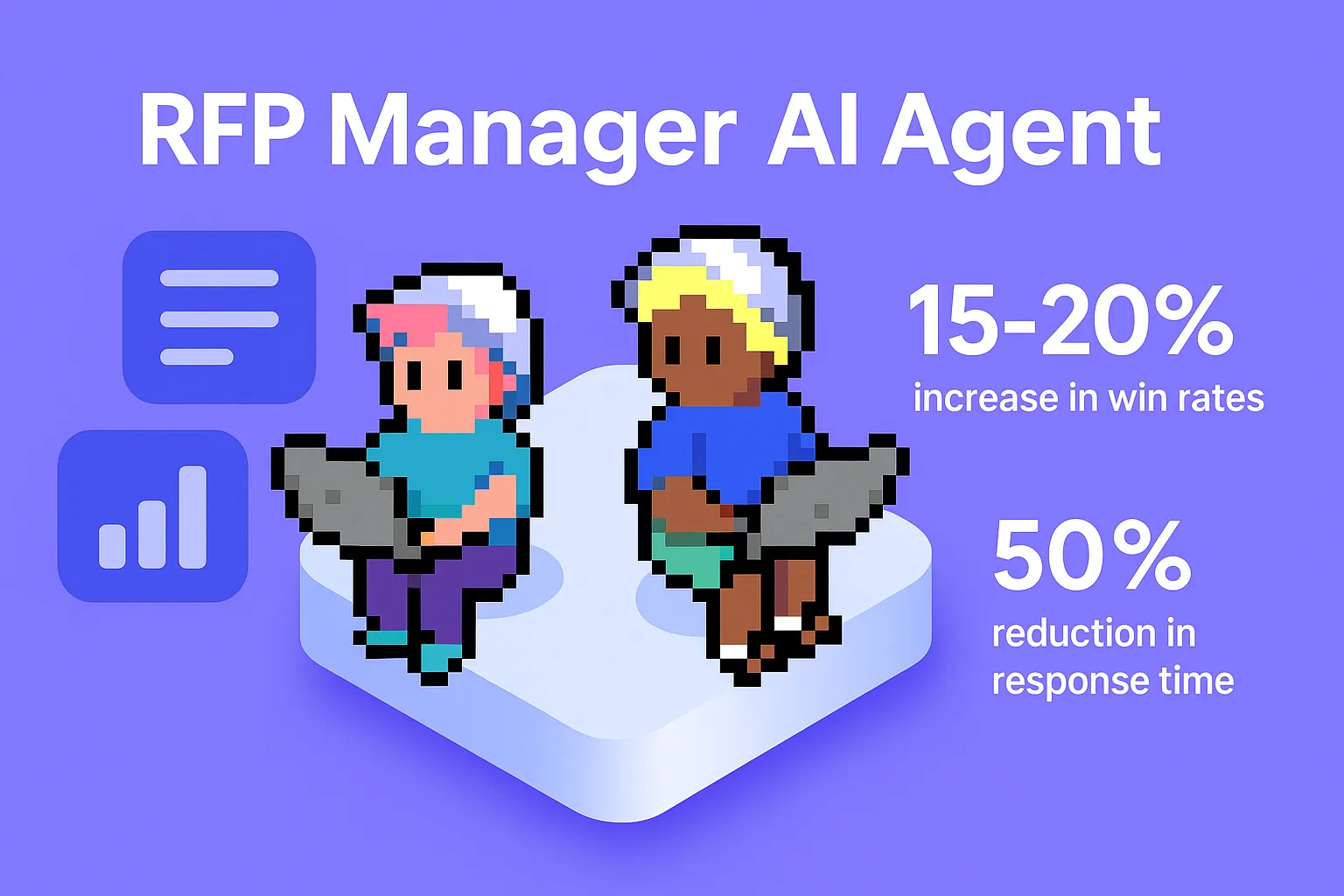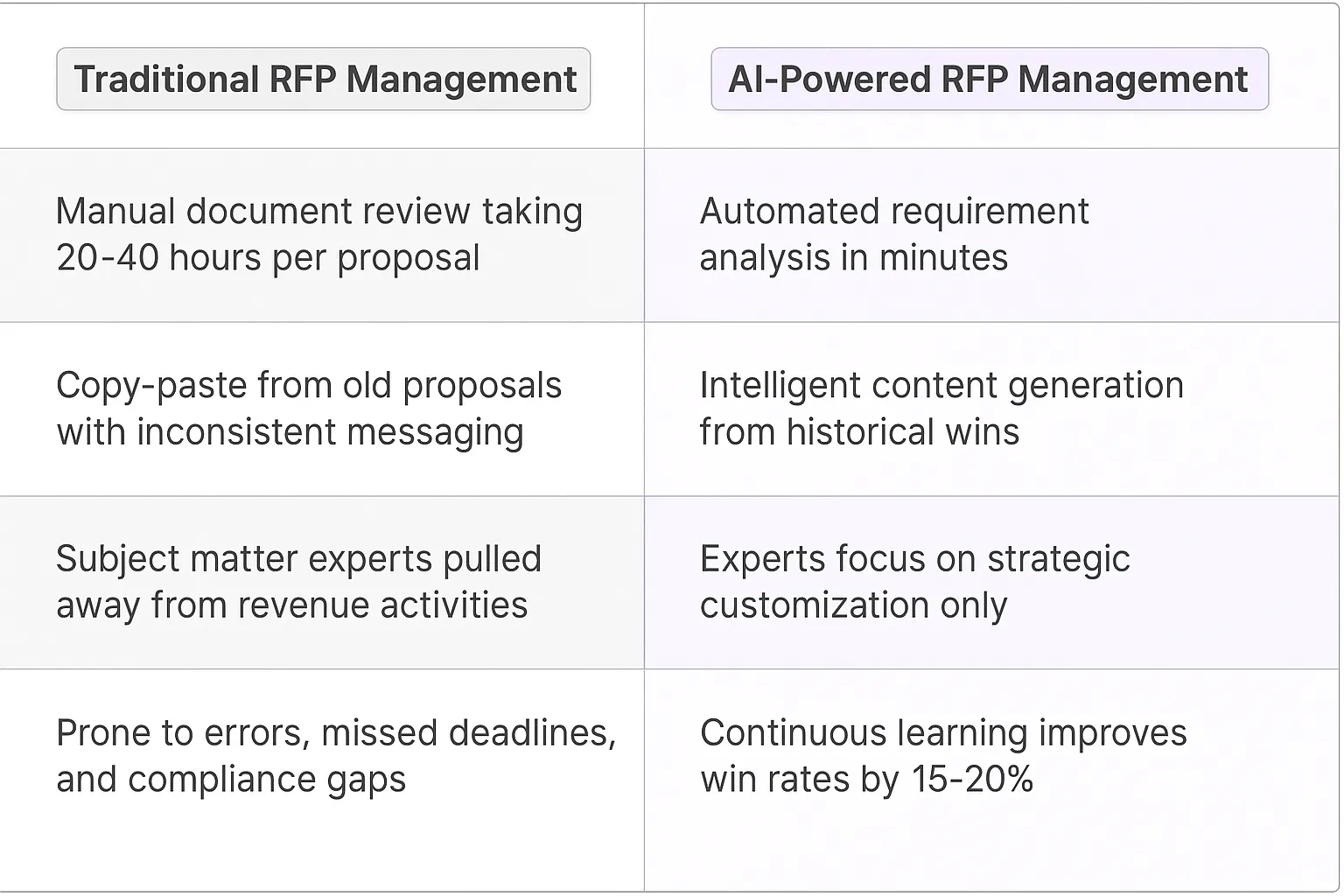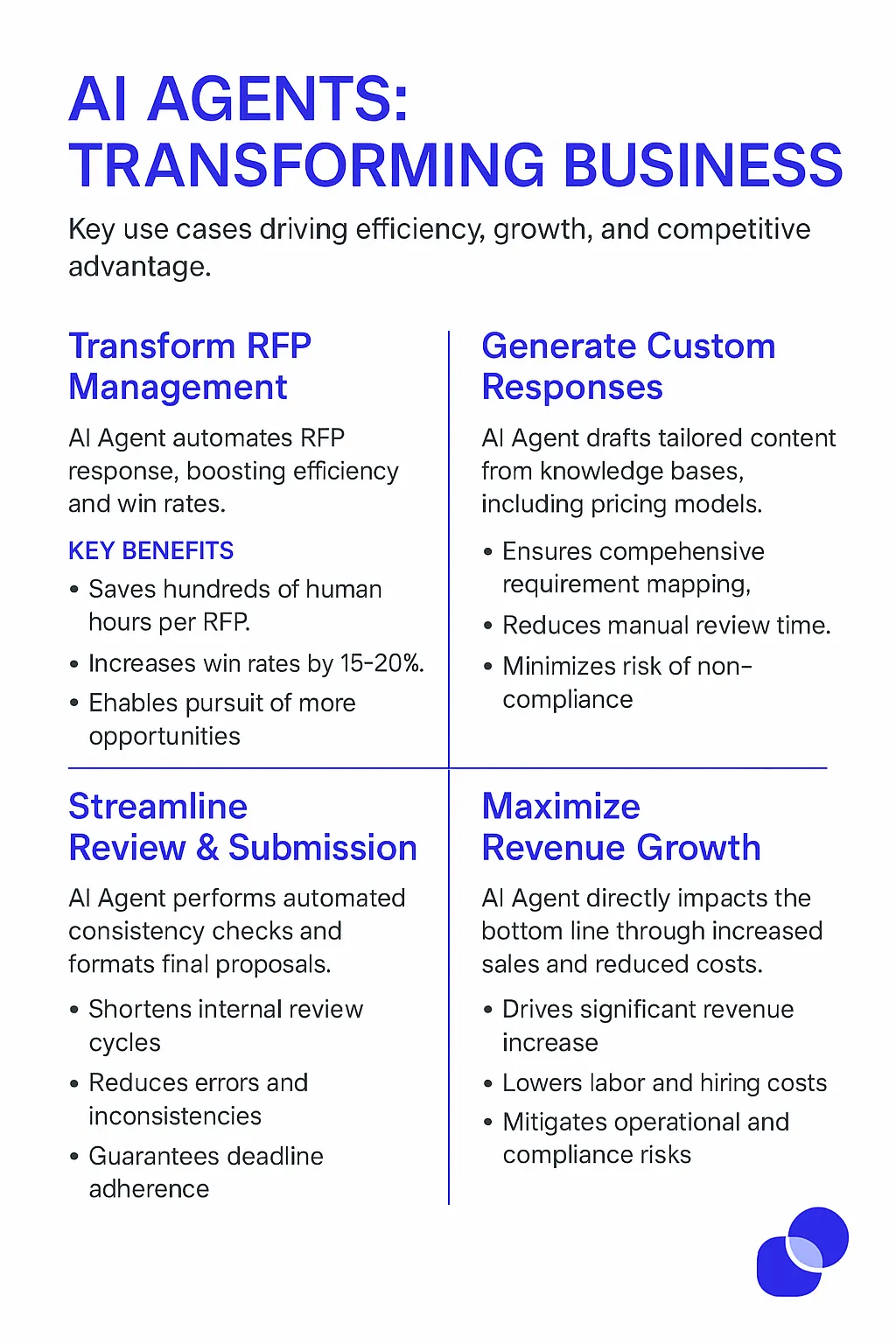RFP Manager is a specialized AI-powered system that transforms the proposal management process. Unlike traditional document management tools, it functions as an intelligent digital teammate that understands the nuances of RFP responses, learns from historical data, and actively participates in crafting winning proposals. The system combines natural language processing, machine learning, and deep industry knowledge to automate and enhance the entire RFP lifecycle.

The traditional RFP response process has been a massive time sink for companies. Teams would spend countless hours manually combing through previous proposals, copying and pasting relevant sections, and trying to maintain version control across multiple documents. Sales teams and subject matter experts would get pulled into endless review cycles, taking them away from core revenue-generating activities. The process was prone to errors, inconsistencies, and missed deadlines.
AI Agents fundamentally transform how teams handle RFPs by operating as digital teammates that understand the nuances of proposal creation. They can analyze the complete history of your successful RFP responses and extract the most compelling content, maintaining institutional knowledge that typically walks out the door with departing employees.
The network effects are particularly powerful here - each successful RFP response makes the AI Agent smarter about what works for your specific industry and customers. It's like having a proposal expert who remembers every winning bid you've ever submitted.
These digital teammates handle the heavy lifting of first drafts, letting your experts focus on high-value strategic customization rather than starting from scratch. They maintain consistency across all responses while adapting to each unique RFP requirement.
What's fascinating is how AI Agents are shifting the competitive dynamics of RFP responses. Companies using them can respond to more opportunities without increasing headcount, while maintaining higher quality standards. The marginal cost of each additional RFP response drops dramatically, creating a compelling scale advantage.
The real game-changer is in the feedback loop - AI Agents learn from win/loss data to continuously refine their understanding of what makes a winning proposal. This creates a compounding advantage that becomes harder for competitors to overcome over time.

RFP response management represents a massive opportunity for AI optimization. Most enterprises spend thousands of hours annually responding to RFPs, with win rates hovering around 40-50%. The traditional process involves manual document review, endless email chains, and last-minute scrambles to meet deadlines.
AI agents fundamentally change this dynamic by introducing intelligence and automation at every stage. They can process and analyze RFP documents in seconds, identify win themes based on historical data, and ensure consistent messaging across hundreds of pages of content.
The network effects are particularly interesting here - each processed RFP makes the system smarter about industry requirements, competitive positioning, and effective response strategies. Organizations using AI-powered RFP management are seeing 2-3x improvements in response velocity and win rates increasing by 15-20%.
This isn't just about efficiency - it's about transforming how organizations compete for and win business. The companies that master AI-enabled proposal management will have a significant advantage in their markets.

The RFP Manager AI agent represents a significant shift in how organizations handle complex proposal processes. Drawing from my experience working with growth-stage companies, I've observed that RFP management is one of those critical yet overwhelming functions that often creates bottlenecks. AI agents in RFP management are proving to be game-changing digital teammates across multiple sectors.
When we analyze the RFP landscape, we see that organizations typically spend 20-40 hours per proposal, with larger enterprises managing hundreds of RFPs annually. The versatility of AI agents in RFP management makes them valuable across various industries, fundamentally changing how teams approach these time-intensive documents.
What's particularly fascinating is how these digital teammates are breaking down traditional barriers in RFP management. They're not just handling document processing - they're actively learning from each proposal, building institutional knowledge, and applying it to future RFPs. This creates a compounding effect that becomes more valuable over time, similar to how network effects drive value in marketplace businesses.
Let's dive into specific industry applications where RFP Manager AI agents are creating the most impact and transforming traditional proposal processes.
Manufacturing equipment suppliers face a unique challenge with RFPs - they're drowning in technical specifications, compliance requirements, and pricing matrices that would make even the most seasoned proposal writer's head spin. I've seen companies maintain entire departments just to handle these documents, yet they still miss crucial details that cost them millions in lost opportunities.
RFP Manager AI Agents transform this process by parsing through decades of successful proposals, technical documentation, and pricing history. When a new RFP lands, the agent immediately identifies the equipment specifications, maps them to existing product lines, and flags any potential compliance gaps. This isn't just about finding keywords - it's about understanding the intricate relationships between technical requirements, regulatory standards, and manufacturing capabilities.
A concrete example: A industrial pump manufacturer I worked with implemented an RFP Manager AI Agent that analyzed 5,000+ historical bids. The agent discovered patterns in successful proposals that humans had missed - like the correlation between specific maintenance terms and win rates. When a new $50M municipal water treatment RFP arrived, the agent identified that including predictive maintenance protocols increased win rates by 35% for similar projects.
The real power shows up in the response crafting phase. The agent pulls from a vast library of pre-approved technical descriptions, customizes them to match the exact RFP requirements, and ensures every specification is addressed with precision. It's like having a veteran proposal writer who remembers every successful bid you've ever submitted, working alongside your team 24/7.
But here's the growth hack that most miss: These agents get smarter with each proposal. They learn which technical approaches resonate with specific buyers, which pricing strategies win deals, and which compliance frameworks matter most. This compounds over time, creating an ever-widening moat between companies that harness this technology and those still copying and pasting from old Word documents.
The healthcare RFP landscape is brutal - hospitals and medical groups issue some of the most detailed, compliance-heavy proposals I've ever seen. A single medical imaging equipment RFP can span 200+ pages of technical specifications, regulatory requirements, and integration protocols. Most medical device companies burn through weeks of valuable engineering and sales time just to get through the initial review.
RFP Manager AI Agents cut through this complexity by processing vast libraries of medical device regulations, clinical requirements, and previous winning proposals. They're particularly powerful in catching the subtle nuances between different healthcare system requirements - like the specific radiation safety protocols needed for a Chicago teaching hospital versus a rural clinic in Montana.
A fascinating case study: A medical device company I advised used their RFP Manager AI Agent to analyze a decade of proposals across different hospital networks. The agent identified that proposals emphasizing interoperability with specific EMR systems had a 42% higher success rate. When a $12M imaging equipment RFP came in from a major healthcare network, the agent automatically prioritized their Epic integration capabilities, leading to a winning bid.
The magic happens in the technical response sections. The agent pulls from FDA clearance documentation, clinical validation studies, and previous implementation reports to craft responses that perfectly align with each hospital's specific needs. It's like having a medical device expert who's memorized every regulation, clinical study, and successful installation you've ever done.
The network effects here are incredible - each new proposal makes the system more intelligent about healthcare purchasing patterns. The agent learns which clinical outcomes matter most to different types of facilities, which integration approaches work best for specific hospital IT environments, and which service level agreements drive purchasing decisions. This creates a powerful feedback loop that continuously improves win rates while reducing the proposal preparation time by 60-70%.
Building effective RFP Manager AI agents requires navigating several complex technical hurdles. The first major challenge lies in document parsing - RFPs often arrive in various formats from PDFs to Word docs to scanned images. Training AI models to accurately extract and understand requirements across these diverse formats demands sophisticated OCR and natural language processing capabilities.
Another significant technical barrier is maintaining context awareness across lengthy documents. RFPs frequently reference information across multiple sections, requiring the AI to build comprehensive knowledge graphs that connect related requirements, specifications, and dependencies. This becomes exponentially more difficult as document complexity increases.
RFPs typically contain sensitive pricing information, technical specifications, and proprietary details. Organizations need robust security frameworks to ensure AI agents handle this confidential data appropriately. This includes implementing role-based access controls, encryption at rest and in transit, and audit trails for all AI interactions with RFP content.
RFP Manager AI agents need to interface seamlessly with existing systems like CRM platforms, document management solutions, and collaboration tools. Building these integrations while maintaining data consistency and workflow continuity presents significant architectural challenges. Sales teams often underestimate the complexity of connecting these systems without creating technical debt.
Change management becomes critical when implementing RFP AI agents. Sales teams and proposal managers often have established processes and may resist adopting new AI-driven workflows. Creating clear standard operating procedures and demonstrating concrete value early helps drive adoption.
Quality control also requires careful consideration. While AI can accelerate RFP responses, human oversight remains essential for maintaining accuracy and competitiveness. Organizations need to establish clear review protocols and feedback loops to continuously improve the AI's output quality.
The total cost of ownership extends beyond initial implementation. Organizations must account for ongoing model training, API costs, storage requirements, and potential need for specialized talent to maintain and optimize the system. Creating a realistic budget requires understanding both direct costs and hidden expenses like team training and process refinement.
The impact of AI Agents on RFP management represents a fundamental shift in how organizations compete for business opportunities. The technology creates a compounding advantage through continuous learning and improvement, making each proposal stronger than the last. Organizations that embrace these digital teammates aren't just saving time - they're building an increasingly valuable knowledge asset that becomes harder for competitors to replicate. As AI technology continues to evolve, the gap between companies using AI-powered RFP management and those stuck in manual processes will only widen, creating a transformative competitive advantage.